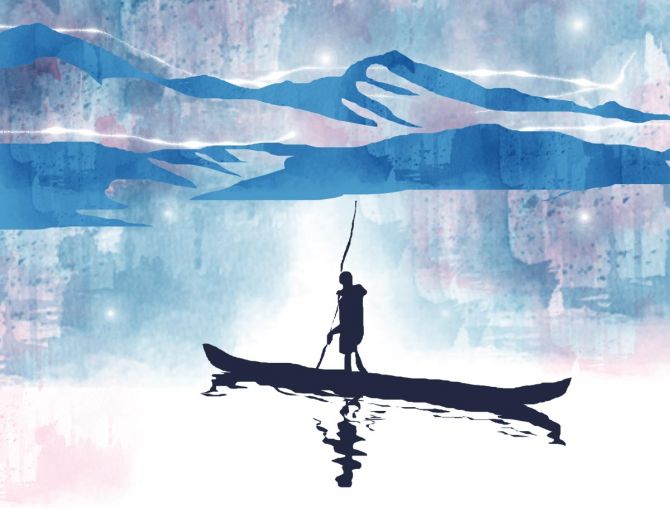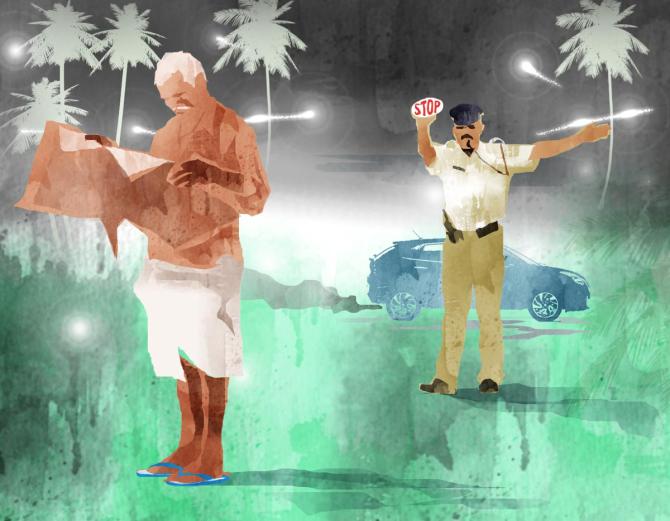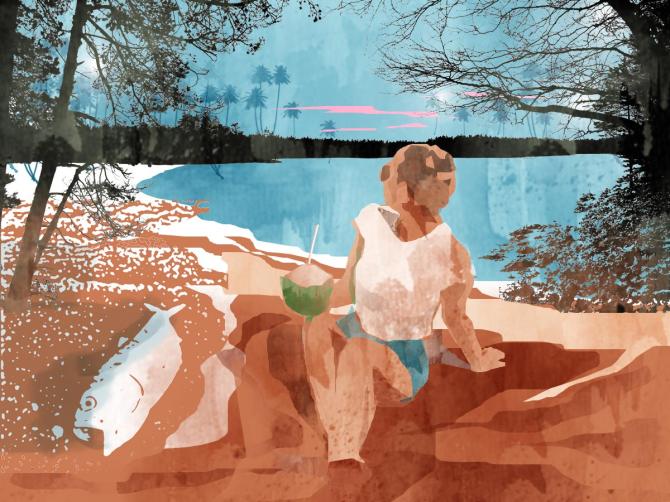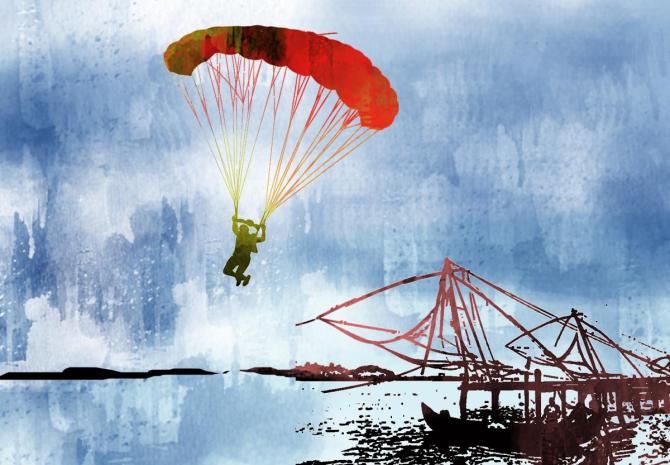Kerala will be one of those places where the line between tourism, a land, a people and their way of life will blur.
It won't be tourism; it will be a visit to experience Kerala.
When TIME magazine listed Kerala (external link) among the World's Greatest Places in 2022, India was not surprised.
But, to truly know the state beyond tired nomenclatures like 'Ecotourism hot spot' (courtesy TIME) or 'God's Own Country' and better understand what Kerala actually offers, it requires an eye untainted by commerce.
Shyam G Menon provides just that.
Illustrations: Dominic Xavier/Rediff.com

Roughly 600 kilometres long, Kerala has the sea on one side and hills on the other.
Of its 14 districts, nine border the sea.
It is a long, narrow state; from any point on the coast, it does not take more than a couple of hours by road to start encountering the foothills that eventually lead to the Western Ghats.
Like the sea, Kerala's hills too extend from north to south, barring small gaps.
Between the coast and the hills lies a sprinkling of flat terrain and sizable bodies of water -- Kerala's backwaters.
Criss-crossing this geography are rivers big and small, although it should be borne in mind that Kerala's rivers don't compare in size to the giant ones seen up north.
With two seasons of rain and fertile soil to boot, the state has traditionally sported a green cover; one that is increasingly deceptive, for both geography and vegetation currently face strong pressures from a humanity insistent on having its way.
Kerala is not exactly a small state. But it is among the smaller big Indian states and, while its population is modestly big overall, its density of population is high.

Slow down
Although among the highest in the Western Ghats, Kerala's hills are small (as indeed are the Western Ghats overall, when compared to mountain ranges like the Himalayas). It makes them sensitive to the onslaught of humanity.
Many destinations are not what they used to be years ago. There is wear and tear and given the inevitability of the process against the backdrop of man's love for money and getting things done using money, you worry what tourism and commercialisation may further do.
Take Kerala's interconnected backwaters for instance.
In my school days, canoes still carried cargo along the canals. Subsequently, the emergent intensity of human dwelling and human activity has polluted the canals and made them (despite attempts at cleaning) a sorry sight. In the intervening years of neglect (till the canals were cleaned), the old riverine commerce faded.
The predicament makes one sad because, if they were still appealing in appearance, these interconnected canals and backwaters (provided blockages are removed) offer passage from the south to at least Ernakulam. It would have been a fantastic stretch to leisurely paddle through in a canoe or kayak.
Manicured houseboat trips have existed for long in the backwaters. But it is canoeing and kayaking that speak more to the emergent post-family mindset.
Exploring and experiencing the place slowly, on foot, bicycle or canoe, would appear an interesting way to know Kerala and also spoil the environment less. But canoeing, cycling, running or walking isn't how things are panning out.
Notwithstanding contemporary politics trying to weaponise itself by attributing unwelcome change to decayed religiosity and morality in Kerala, it wouldn't be wrong to point the finger at money.
Progress is a much-spoken word in the state but, as in other places, the most widely embraced notion of progress in Kerala's remittance economy is a ton of money in the bank and possessions to show off.
Among visible ambassadors of this paradigm (besides the mansions dotting the land) is a robustly developed automobile culture. Some estimates claim that the state, with a population of 3.4 crore people, has around 1.3 crore vehicles.
Given Kerala's share of senior citizens in its population, a portion of this vehicle ownership may be justified.
But what automobiles do is similar to what guided ascents up Everest and other major peaks have done to mountaineering. Once the summit became accessible for a fee, we started getting a new breed of climbers, suddenly expert and veteran because they purchased the experience of ascending Everest.
It's the affordability game; it not affection for the destination or the outdoors.
In Kerala, the potential damage to hills and forests by a similar attitude can be significant because the scale of the state's natural beauty is small.
There is also the progressive mental dullness inflicted on tourism by dominant habits like motoring. You see the same stereotype everywhere. If its destinations are thus a race against monotony by tourism and motoring, what can Kerala do to sustain its appeal to the outside world?
There are a few options.

Showcase the whole, not just the specific
For the first, a good metaphor would be the typical vegetable garden in Kerala.
Although mono-cropped plantations and those with limited diversity exist in the state, left to themselves, the natural drift among people is to court cultivation featuring diversity.
The ground level feel of Kerala is the same -- the state's three major religions are almost evenly matched as regards numbers and the possessions of the rich, middle class and poor overlap given the shortage of space and the sweep of urbanisation.
Social reforms that happened over the past two centuries have taken deep roots and ensured that justice and equality cannot be easily overlooked in social and political conduct. People will speak up.
The average level of education/awareness is decent and there is curiosity about the outside world. Despite the insularity spreading gloom in India, it is still possible to have conversations in Kerala on various subjects without tremendous worry over political correctness.
Kerala's cuisine sports bold variety. Art shows like the Kochi Biennale draw a good number of visitors and Malayalam films, known for their portrayal of reality, as opposed to the fantasies and agenda-driven productions of Bollywood, are among the finest in India.
Music spans the local and classical to excellent rock bands. Not to mention -- the state loves sports; a FIFA World Cup will see loyalty to international teams expressed in many ways including football greats painted on the side of transport buses.
Simply put, the vibrancy of a people can complement destinations attached to them. The possibilities this opens also help disperse the impact of tourism.
The average Malayali knows s/he is as distinct as anyone from anywhere else but, on subjects that they like, won't hesitate to connect on its terms. Given the prevailing times, this liberal mindset is a phenomenon under threat.
Freedom of expression is generally understood as an important right in Kerala but it survives in space progressively shrunk by political pressure from elsewhere in India that would like to see the state mainstreamed. As long as the liberal mindset persists, you have in Kerala a place and a people you can engage with on multiple topics; not merely a destination by geography.
You may not have magnificence by geographical scale, you may not be able to reverse the scars inflicted on natural beauty but you can have a bit of everything, tread light (for destination's sake) and, if you manage your choices well, come off with a refreshed feeling.
Second, everywhere in India, the sea has remained poorly tapped for its potential in tourism.
Unlike land, which has been visibly gathering stress, the sea is a vast playground. Kerala has done little to unlock the tourism potential its neighbouring sea holds. And when it does, it should be about sailing, not casinos with parties aboard for entertainment.
The sea gave Kerala, its face and character. Bring it back.
Third, the money in tourism -- based on land and sea -- may lay with families on the move. But if you imagine away from families and design for the individual (and groups shaped by common interest), you open a modern world of exploration and commitment to activity. One that may also be in sync with younger generations, whose sense of future -- including the need to protect the planet -- is often buried by the tendencies of old-fashioned society and money.
Finally, a minor adjunct of significant impact -- never make all this only about money. Excessive monetisation demeans human intelligence. Instead, encourage those who wish to learn and know.

Resurrect the visitor
Going forward, active management of what it is as a whole should be Kerala's USP in tourism. God's Own Country... that tagline is passe. Especially in times of land under pressure and divinity politicised.
I strongly suspect Kerala will be one of those places where the line between tourism, a land, a people and their way of life will blur.
It won't be tourism; it will be a visit to experience Kerala. It won't be a tourist coming there; it will be a visitor. Tourists pay money and go back home; visitors are known to change.
Given the sickness of money demeaning existence everywhere and the brooding gloom cast by conservative governments, it won't be long before a suffocated humanity digs deeper to discover afresh, what it is to be human in a wide open universe.
Shyam G Menon is a Mumbai-based columnist. You can read his work here.









